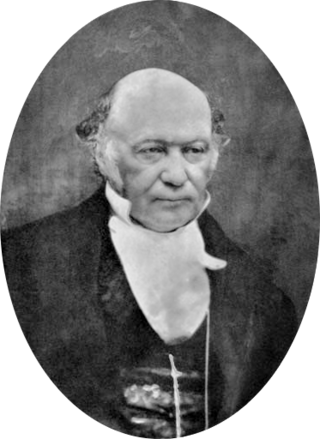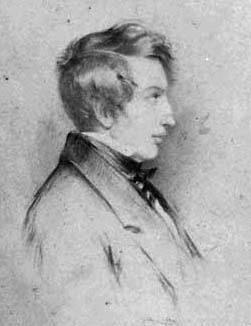Related Research Articles

George Boole was a largely self-taught English mathematician, philosopher and logician, most of whose short career was spent as the first professor of mathematics at Queen's College, Cork in Ireland. He worked in the fields of differential equations and algebraic logic, and is best known as the author of The Laws of Thought (1854), which contains Boolean algebra. Boolean logic, essential to computer programming, is credited with helping to lay the foundations for the Information Age.

Sir William Rowan Hamilton was an Irish mathematician and physicist. He was Andrews Professor of Astronomy at Trinity College Dublin.

Dionysius Lardner FRS FRSE was an Irish scientific writer who popularised science and technology, and edited the 133-volume Cabinet Cyclopædia.

James Hamilton, 1st Duke of Abercorn,, styled Viscount Hamilton from 1814 to 1818 and The Marquess of Abercorn from 1818 to 1868, was a British Conservative statesman who twice served as Lord Lieutenant of Ireland.
Torrens title is a land registration and land transfer system in which a state creates and maintains a register of land holdings, which serves as the conclusive evidence of title of the person recorded on the register as the proprietor (owner), and of all other interests recorded on the register.

Richard Lalor Sheil, Irish politician, writer and orator, was born at Drumdowney, Slieverue, County Kilkenny, Ireland. The family was temporarily domiciled at Drumdowney while their new mansion at Bellevue, near Waterford, was under construction.

Sir Robert John Kane was an Irish chemist and educator.

Sir James Cockle FRS FRAS FCPS was an English lawyer and mathematician.
Land registration is any of various systems by which matters concerning ownership, possession, or other rights in land are formally recorded to provide evidence of title, facilitate transactions, and prevent unlawful disposal. The information recorded and the protection provided by land registration varies widely by jurisdiction.

Robert Torrens was a Royal Marines officer, political economist, part-owner of the influential Globe newspaper, and a prolific writer. He also chaired the board of the London-based South Australian Colonisation Commission created by the South Australia Act 1834 to oversee the new colony of South Australia, before the colony went bankrupt and he was sacked in 1841. He was chiefly known for championing the cause for emigration to the new colony, and his name lives on in Adelaide's main river, the Torrens, the suburb of Torrensville and a few other places.

Edwin Richard Wyndham-Quin, 3rd Earl of Dunraven and Mount-Earl, KP, PC, FRAI, FSA, FRGS, FRS, styled Viscount Adare from 1824 to 1850, was an Irish peer, Conservative Member of Parliament, and archaeologist.

Colonel Sir Charles Beaumont Phipps, was a British soldier and courtier.

James Thomson was a British Irish mathematician. He was the father of the engineer and physicist James Thomson and the physicist Lord Kelvin.

William Torrens McCullagh Torrens was an Irish Liberal politician, who sat in the House of Commons for various constituencies between 1848 and 1885.

Duncan Farquharson Gregory was a Scottish mathematician.
Edmund Hayes, was an Irish judge. In 1858 he became Solicitor-General for Ireland.
John Radford Young was an English mathematician, professor and author, who was almost entirely self-educated. He was born of humble parents in London. At an early age he became acquainted with Olinthus Gilbert Gregory, who perceived his mathematical ability and assisted him in his studies. In 1823, while working in a private establishment for the deaf, he published An Elementary Treatise on Algebra with a dedication to Gregory. This treatise was followed by a series of elementary works, in which, following in the steps of Robert Woodhouse, Young familiarized English students with continental methods of mathematical analysis.
Charles Edmund Wilkinson (1801–1870) was a British army officer who rose to the rank of Major-General and served as acting Governor of British Ceylon.

The Revd Dr James Booth, (1806–1878) was an Anglo-Irish clergyman, notable as a mathematician and educationalist.
James Lockhart (1763–1852) was an English banker who wrote on numerical analysis.
References
 This article incorporates text from a publication now in the public domain : "Hargreave, Charles James". Dictionary of National Biography . London: Smith, Elder & Co. 1885–1900.
This article incorporates text from a publication now in the public domain : "Hargreave, Charles James". Dictionary of National Biography . London: Smith, Elder & Co. 1885–1900.